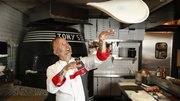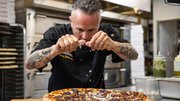Article
Q&A with Sue Morelli, CEO of Au Bon Pain
Morelli was named CEO in 2004 and has since helped double the chain's locations.

October 8, 2007 by Valerie Killifer — senior editor, NetWorld Alliance
Sue Morelli has been a fixture at Boston-based Au Bon Pain (which means "with good bread") for nearly 20 years. Her career with the company began in 1988, when she was hired to assist the chain's founders.
But Morelli quickly rose through the ranks, serving in almost every executive capacity. Morelli was named company president and chief executive officer in 2004 and has since helped double the chain's locations — from 119 in 2006 to more than 230 today — and to increase its international presence.
Fast Casual recently had the opportunity to ask Morelli, a Harvard Business School graduate, about the company's direction and where the bakery-café segment is headed.
Au Bon Pain recently launched a soft-urban concept in select high-traffic locations. What is the difference between the company's soft urban and Bistro concepts?
Soft urban is a more comfortable version of our current urban café. It still features our marketplace serving area with an abundance of fresh food and self-service, but it has more muted colors and a warmer, more welcoming seating area. The Bistro is a suburban concept designed to sit and stay. It has the same food offering as the urban concept, plus more dinner and kid items.
Describe the differences between urban and suburban diners.
In a word, time. The urban guest is more time-starved but still wants to eat good food. They may grab and go or they may grab and stay, but time is at a premium for this group. The suburban guest has more time to relax over his or her food and often comes in pairs or groups. They, too, come for the great food but they also come to socialize and are more impacted by the design and motif of the overall environment.
What do you think is the one thing urban and suburban customers consistently look for when choosing where to dine?
Our guests tell us that it's the food, and then high hospitality. We have unique foods that other places don't offer, like our Salmon Wasabi Breakfast Sandwich or our Prosciutto Mozzarella lunch sandwich. Even our tuna salad is different enough with chopped carrots that we get letters about it. From there, it can be several different things: convenience of the location, speed of service, seating, parking, etc. Friendly, beyond-the-ordinary service has become a competitive differentiator for us.
During your 20-year tenure at Au Bon Pain, you have served as its vice president of marketing, of catering, of corporate mergers and acquisitions and of institutional sales. What position best prepared you for the role of president?
They all have contributed in different ways. The one common thread is understanding the soul of our brand and delivering it in all aspects of our business. We have a very human brand and you can see it in how we interact with guests, landlords and prospective franchisees. It's all about relationships.
| ||||||||||||||||||
We are seeing more women achieve a great deal of success in the restaurant business. What types of opportunities do you think are available to women in the foodservice industry?
There are opportunities at all levels, from entry to senior executive. This is, and always has been, a female-friendly industry. In the last two years, Au Bon Pain's top GMs have been women.
What types of changes have you seen the bakery café fast-casual restaurant undergo over the past 20 years?
The extension beyond fresh baked goods. When we first started, we sold just great bread and croissants. Some of the regulars started showing up with cold cuts and asked us to cut the bread so they could make sandwiches. You can guess what we introduced next. While the business has evolved, it is still about basic good food, but done better than anyone else, and constantly innovative. It also is about speed of service in the urban locations. Our marketplace-café design allows the guest in a hurry to get in and out, and of course nutrition has become very important in our menu design. So in sum, we're an organization geared to be flexible to meet the differing needs of guests, as they evolve.
Where do you think the bakery café is headed over the next 20 years?
Our category will continue to evolve to meet guest demands, but we always will be about good, fresh foods. Technological advances are important, but in our industry it will be more about great flavor and taste combinations, offered as fresh and as nutritionally sound as possible. We also believe human interaction with our guests will remain key. People connect with people and our design and philosophy encourage that guest interaction.
What role will nontraditional restaurant locations — such as airports, ball parks and college campuses — play in the foodservice future?
People are going to continue to want high-quality foods wherever their travels take them. In fact, we expect the bar for quality products, served conveniently, to continue to rise. We expect these types of locations to grow even faster than traditional locations, and already they have a strong foothold in college campuses and airports.
If you were to give any restaurant-industry advice to those just starting out, what would it be?
Work for a brand that you love and have passion for.
Related Media
Food & BeveragePresented ByOracle
Presented ByOracle
 ChatGPT
ChatGPT Grok
Grok Perplexity
Perplexity Claude
Claude













